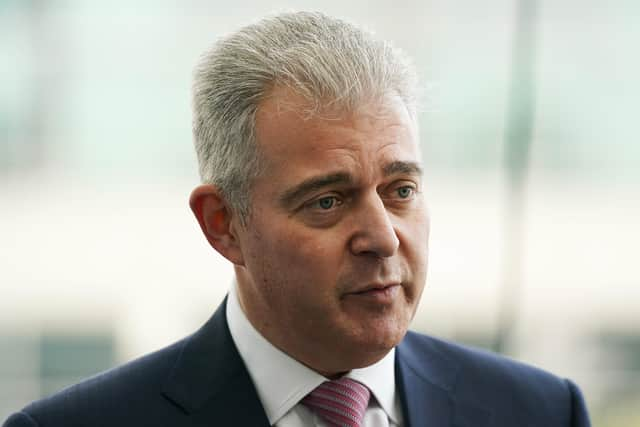Brandon Lewis says chances of Troubles prosecutions ‘are almost nil’
and live on Freeview channel 276
In the face of opposition from all the parties at Stormont and a host of victims’ campaign groups, Mr Lewis said that given that most cases were more than four decades old the prospect of criminal prosecutions was almost nil.
The Northern Ireland Troubles (Legacy and Reconciliation) Bill will shift the focus on the Troubles from police investigations and criminal trials to a “truth recovery process” where suspected perpetrators would be given amnesties in return for their participation in reports to victims’ families over what happened to their loved ones.
Advertisement
Hide AdAdvertisement
Hide AdThe secretary of state told the Commons that he had listened to the “pain and perspectives of people from all view points and communities”.


Mr Lewis continued: “During those conversations we have repeatedly had to confront what is a very painful reality, that with more than two-thirds of Troubles-related cases now 40 years old, the prospect of successful prosecutions is vanishingly small.
“And what is why this legislation does mark a definitive shift in focus to put information recovery for families at its core, in recognition of that.”
He said that while there has been exceptional progress in Northern Ireland “the Troubles continue to cast a shadow over all those impacted and wider society”.
Advertisement
Hide AdAdvertisement
Hide AdStressing the sensitivity and complexity of the legacy issue from the conflict, Mr Lewis said: “But what we cannot do, is as a result of that, stand by and do nothing. We cannot let the status quo continue. To do so would be a dereliction of duty.”
The Northern Ireland secretary assured MPs that those IRA members who held previous correspondence from Tony Blair’s government that they would be immune from prosecutions will be subject to the same rule as everyone else covered by the bill.
“These provisions will apply to individuals who have previously been provided with so-called on-the-run letters, letters of comfort. These letters when issued confirmed whether or not an individual was wanted by the police based on evidence held at that time.
“However, I want to be crystal clear that these letters have absolutely no legal standing and cannot be used to prevent prosecution under this new approach.”
Advertisement
Hide AdAdvertisement
Hide AdMr Lewis added that veterans will no longer “have to live in perpetual fear of getting a knock on the door for actions taken in protection of the rule of law decades ago”.
The bill cleared its first House of Commons hurdle after MPs gave it a second reading by 285 votes to 208, majority 77 on Tuesday evening.
The government commands a working majority of more than 70 and the bill passed with only Conservative MPs supporting it.
Shadow Northern Ireland secretary Peter Kyle said Labour’s opposition to the bill was based on their belief that it “doesn’t prioritise victims” of the conflict.
Advertisement
Hide AdAdvertisement
Hide AdMr Kyle accused the secretary of state and Boris Johnson of “getting on their steamroller” and “wrecking a one-off opportunity to deliver for victims”.
The Labour MP for Hove said that for Troubles victims such a process “deepens their pain and trauma”.
He also criticised the “low bar for immunity” regarding suspected perpetrators of Troubles crimes stating that it was set “so low” that it was impossible to see any prosecutions happening.
“Such a low bar is offensive to the families who have lost loved ones and in many cases waited for decades for answers,” Mr Kyle added.
Advertisement
Hide AdAdvertisement
Hide AdTuesday’s second reading for the bill was the first time MPs got a chance to debate the legislation since it was laid before Parliament earlier this month.
DUP Strangford MP Jim Shannon appeared to hold back tears when he described the “murders” of his cousin and other victims by the IRA, and the subsequent lack of accountability.
Mr Shannon described his “angst and agony” for his constituents, adding: “I want to have the justice that they have been denied for over 50 years.”
He challenged the UK government to explain what they were doing to ensure that that happened.